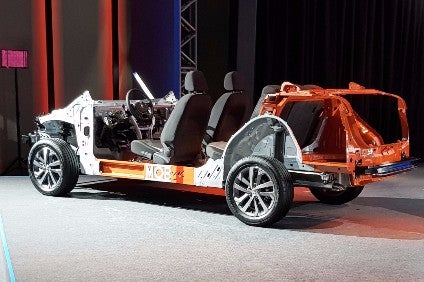
Volkswagen's top executive, Herbert Diess, chooses his words carefully but does not refuse to answer on any subject.
He spoke to just-auto at the headquarters of VW do Brasil, in São Bernardo do Campo (SP) in the evening ahead of a joint announcement with Argentina's president Mauricio Macri of a $650m spend at the General Pacheco plant in Greater Buenos Aires.

Discover B2B Marketing That Performs
Combine business intelligence and editorial excellence to reach engaged professionals across 36 leading media platforms.
A mechanical engineer, 59 years old, born and edcuated in Munich, Diess worked his way to the top of BMW development board before, in July 2015, being poached to head the Volkswagen brand. We wonder if he knew of the challenges ahead. Two months later, the Dieselgate crisis broke in the US to before extending to Europe and other markets.
It's not off-topic for Diess.
"VW needed changes before this episode. We are engaged in ambitious plans for new technologies such as hybrids, electric and autonomous. By 2025, we will be producing 1m electric vehicles worldwide in a total of 23 models. Electrification will be distributed by regions and, in China, there is a more rigid goal than Europe to fulfill. But in Brazil, ethanol can help control CO2 emissions rationally. We also decided to decentralise and give more autonomy to the subsidiaries to decide on commercial products and strategies", he said.
Diess admitted that only a bold plan, such as the current one, for technological approach and new products, could bring the German brand back to market leadership in Brazil, where it is now in third place. He acknowledged the Brazilian subsidiary would also benefit from a now competitive exchange rate and thus export more.
Directly questioned about on affordable, entry level models, he responded: "VW will not go for a bare, less technically [complex] sub-brand. But, even so, we have not given up on entry level models like the Gol. In 2018 we will have news and there will be long term solutions for this important segment."
Pablo Di Si, Argentine president of VW of Brazil and South and Central America, plus the Caribbean regions, outlined recovery of both the economy and the auto market in Brazil.
"We never had such a wave of VW new model launches in just four years. By 2020 there will be 20 new products, not counting niche models like the Golf GTE hybrid and EV," he said.
Out those 20 models, 14 will be built in Brazil, the redesigned Polo already included. The automaker does, however, count in model year updates and new powertrains.
Of those entirely new the limelight is on the Virtus saloon (on sale 21 January), the T-Cross to be launched almost simultaneously with Europe in he second half of 2018, and for 2019, a new, four-door double cab pickup truck sized between the VW Saveiro and the Fiat Toro.
Update of the Gol, Up, Voyage, Golf and Golf GTI and Saveiro are in the pipeline. According to local speculation, the 13th model might be the Fox's successor, a smaller and more affordable crossover than the T-Cross, much like the Honda WR-V.
From Argentina will come the current, mid-size Amarok pickup with diesel V6 power (considered an extra model with a full redesign due in 2020), the midsize Tharu SUV (VW's version of the Skoda Karoq) in 2019; from Mexico, the Jetta and seven seat Tiguan Allspace in 2018; and, from Germany, the redone Passat (2019).
Virtus and IBM Watson
The Polo-derived Virtus compact saloon, on the MQB platform, will be the first car in Brazil to feature connectivity and digitalisation. It will have a 'cognitive owner's manual' that employs IBM's Watson Artificial Intelligence (AI).
This brings interaction with the vehicle. The car will respond to a driver's questions about the car in Portuguese or Spanish. The application interprets and uses natural speech to also retrieve information from onboard literature. A traditional printed manual will still be supplied.






